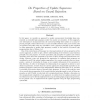247 search results - page 45 / 50 » Answer set programming with default logic |
114
click to vote
ML
2006
ACM
15 years 1 months ago
2006
ACM
We propose a simple approach to combining first-order logic and probabilistic graphical models in a single representation. A Markov logic network (MLN) is a first-order knowledge b...
LPNMR
2009
Springer
15 years 7 months ago
2009
Springer
We report on recent advancements in the development of grounder Gringo for logic programs under answer set semantics. Like its relatives, DLV and Lparse, Gringo has in the meantime...
130
click to vote
TPLP
2002
15 years 24 days ago
2002
In this paper, we consider an approach to update nonmonotonic knowledge bases represented as extended logic programs under the answer set semantics. In this approach, new informat...
110
click to vote
LPNMR
2001
Springer
15 years 5 months ago
2001
Springer
In this paper bounded model checking of asynchronous concurrent systems is introduced as a promising application area for answer set programming. As the model of asynchronous syst...
129
click to vote
ICTAI
2007
IEEE
15 years 7 months ago
2007
IEEE
We review a method of generating logical rules, or axioms, from empirical data. This method, using closed set properties of formal concept analysis, has been previously described ...

